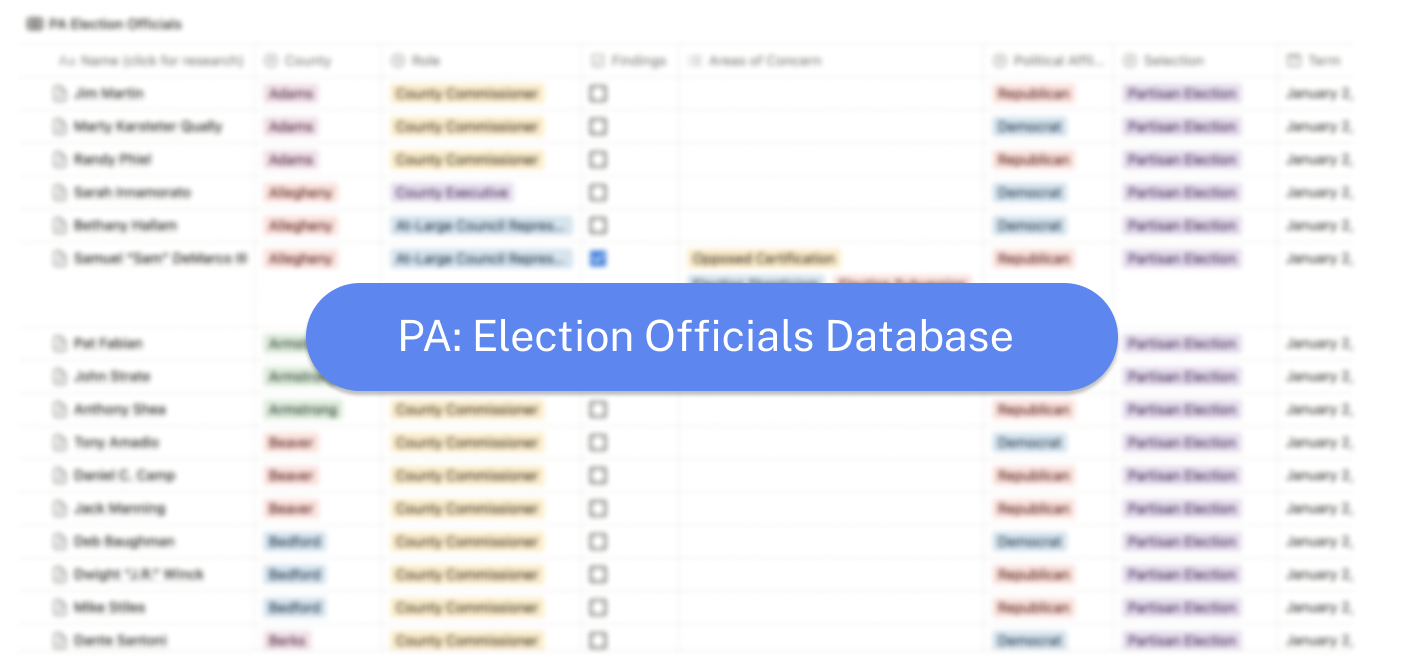NEW REPORT: Pennsylvania 2024 Vote Counting and Certification
Plus, trends we're tracking this election
Today, we’re kicking off the release of our 2024 State Election Administration Reports with our first report: Pennsylvania 2024 Vote Counting and Certification Report.
As with all of our research, our mission is to instill confidence in our voting systems by shedding light on the rules and quality assurance steps in place that ensure fair and accurate counting and certification processes. In identifying potential vulnerabilities in the system and election administrators, we intend to support pro-democracy partners like you to better monitor our elections, target corrective action, and, in turn, protect the integrity of our elections.
In this report, you’ll find detailed information about the processes that govern counting and certification, the offices that oversee those processes, as well as a detailed research library of the 209 County Boards of Elections Members in Pennsylvania.
For a summary of this report, you can also check out our Key Findings one-pager.
This Wednesday, June 26 at 11:00 a.m. ET, we’re hosting a briefing for reporters on this report. Please register here if you wish to attend the briefing.
We also welcome direct feedback and questions on the report. Don’t hesitate to reach out to info@informingdemocracy.org. And stay tuned in the coming weeks and months for reports on election administration in additional states.
Highlights from the Pennsylvania 2024 Vote Counting and Certification Report
Counting and Certification Timeline
Included in this report is a timeline for each of the vote counting and certification steps. This timeline allows you to see all of the processes going on at the same time, including:
In-person mail voting
Absentee ballot requests and processing
Pre-canvassing of mail ballots
Submitting official returns
County-level canvass
Certification
Potential recounts and challenges
In addition to the timeline for each of these steps, we provide details on how each step takes place, as well as the offices and personnel that oversee these processes.
Note: We will do our best to keep this timeline up-to-date throughout the election period, but we recommend verifying all dates in this calendar with official sources.
Election Official Research Database
We conducted public record reviews of the 209 County Boards of Elections Members in Pennsylvania to identify whether any past behavior raised concerns about their commitment to fair election administration.
Our review looked for statements or actions that indicated election skepticism or denial, attempts to subvert election administration or undermine faith in the system, sharing election conspiracies, and other anti-democracy sentiments.
Of the 209 County Boards of Elections Members, we identified concerning findings in the backgrounds of 49 officials, or 23%. The vast majority of Pennsylvania’s election officials are pro-democracy.
You can look further into each of these individuals in our Election Official Research Library.
Potential Vulnerabilities in Pennsylvania
While there are numerous safeguards in place to protect the vote counting and certification processes in Pennsylvania, we have identified several potential vulnerabilities, some of which could be exploited by anti-democracy actors seeking to undermine our voting systems or to sow doubt about the integrity of our elections.
Among these vulnerabilities include the decentralization of election administration, leaving discretion up to the County Boards of Election. While state law provides general uniformity in these processes, there are notable areas in which the Boards have broad discretion. This opens the door to an outsized influence from bad actors.
This can show up in places like deciding staffing and resources, how to process, pre-canvass, and canvass absentee and mail-in ballots, and the refusal to certify results, which we have seen take place in recent years.
There also exists a threat of underfunding election administration, making it harder for County Boards of Election to execute their roles. This is a trend we’ve seen in Pennsylvania, as well as in other states.
As with past reports, we are using Notion to share this report in hopes that it provides an easy format to navigate and allows us to make ongoing updates as the election season unfolds. Visit this page for more information on how to use Notion.
We hope you find this report useful, informative, and easy to navigate.
As always, we’re available for questions about this research and eager for your feedback, both on the research findings as well as presentation. Don’t hesitate to reach out.
Thank you,
Informing Democracy Team




